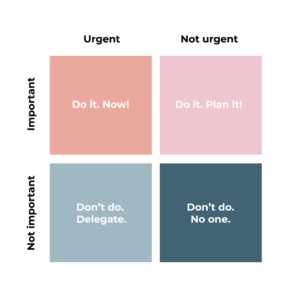In the hectic pace of everyday life it is not always easy to set the right priorities. How often does a week go by without contacting that old friend or without an evening for yourself? The busier we are, the greater the need to set priorities and make choices. But how do you do that?
Urgent/important principle
The quadrant is an important tool when determining priorities. This quadrant is derived from the statement by D. Eisenhower: “urgent matters are seldom important and important matters are seldom urgent. The model is widely used within time management.
How does this quadrant work?
 The quadrant indicates what is important and what is urgent. Important tasks are those that are valuable or necessary to do. Non-important tasks may be fun to do (like playing a game on your phone), but do not cause problems when they are not done. Urgent means that something is urgent and needs to be done in the short term. Non-urgent matters can still wait a while.
The quadrant indicates what is important and what is urgent. Important tasks are those that are valuable or necessary to do. Non-important tasks may be fun to do (like playing a game on your phone), but do not cause problems when they are not done. Urgent means that something is urgent and needs to be done in the short term. Non-urgent matters can still wait a while.
Based on this you can classify tasks in the following categories:
- Important – urgent: these tasks have priority because they are both important and urgent. They are deadlines or crisis situations, for which you have to take action now. For example, pick up your sick son at school or call a handyman for your broken boiler.
- Important – not urgent: the tasks that are important in the longer term and for which you want to spend sufficient time. Think of meeting that friend or preparing a job interview properly. So it’s handy to schedule this!
- Not important – urgent: these are tasks that can be done now, but are not important to you. For example, attending an unimportant meeting or completing a marketing survey. Tip: skip this or ask someone else to do it.
- Not important – not urgent: this is a “waste of time”. The tasks that don’t have a deadline and are not important, like watching YouTube videos or keep chatting with a colleague. Is this how you want to spend your time?
More tips
Below I give you more tips for setting priorities:
- Schedule some time every day to set priorities. This does not have to be long; 10 minutes may be enough. Make a task list and determine what has priority. The start of your day can be a pleasant moment, but it can also be good to create an overview of what is left at the end of your day.
- Use a fixed location to keep track of your priorities. Do not use loose papers, but use a to-do booklet, a whiteboard or an excel file. It gives you peace of mind when you know that your tasks are written down somewhere.
- Keep it simple and well-arranged. The more extensive and detailed your task list, the more unclear and therefore the harder to stick to. Use colors to indicate which tasks have priority and which ones can wait.
- Don’t forget to put fun and relaxing activities on your list! These are also important.
Do you want help with prioritizing? A PsyQ psychologist can help you online.
Is your head ‘full’, do you have a long to do-list or do you feel that everything is getting too much for you? There is a technique for setting priorities very easily. You only have to ask yourself one simple question: must I do this now?
The key is to no just ask this question in one way but in in five different ways. Every time you put the emphasis on one of the five words. The meaning of the question (and therefore the answer) changes if you emphasize another word:
- MUST I do this now?
- Must I do this now?
- Must I DO this now?
- Must I do THIS now?
- Must I do this NOW?
Do you already notice a change?
Must I do this now? Is it a must or is it something that you would like to do? Have you imposed this on yourself or have someone else imposed it on you? Or can you skip the task?
Must I do this now? Do you have to do this task? Or could a colleague, family member or partner also do this very well? Can you leave this to someone else? Delegating a task can be better sometimes, because you are not good at it yourself, because you have little time or because you do not enjoy it.
Must I DO this now? Or must you leave this?
Must I do THIS now? What really needs to be done? Would you rather do something else? Is this really the wisest way to spend your time and attention at the moment?
Must I do this NOW? Is it a task that can wait a little longer? Does it really have such a priority? Are there other things that deserve your attention now? Do you come a step closer to your dream life with what you are doing now?
Have you answered all these questions with a “no”? Then worrying is not necessary. You can better delegate it, ignore it or schedule it for a later moment. Give it a try! You will immediately notice that it gives more mental space.
Help needed?
Do you want more help in setting priorities or in making choices? A NiceDay psychologist can help you. You can get started right away.

